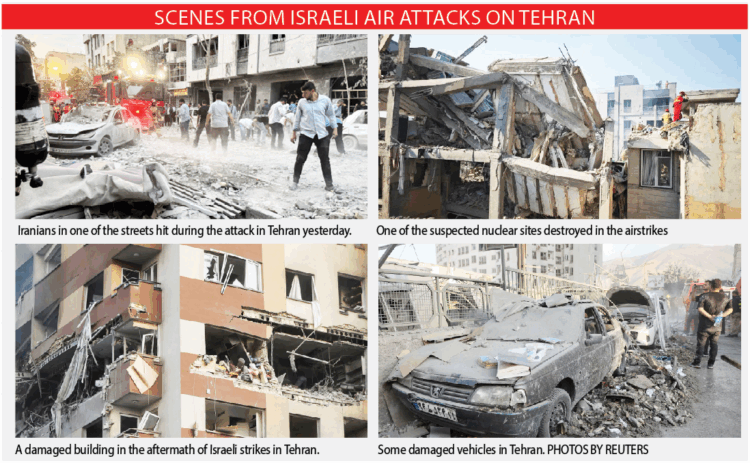World leaders have called for caution amid fears of regional expansion of conflict following the coordinated attacks on Iranian nuclear sites and military facilities by Israel even as some condemned the attack, calling it a provocation.
The Israeli Defence Forces carried out strikes on Iranian nuclear sites overnight, saying the strikes killed Revolutionary Guard chief Hossein Salami and other commanders including some scientists working on the sites.
Iran said six scientists were among those killed, with state TV reporting that civilians, including children are among the dead.
Iran, in a retaliation, launched ballistic missiles at Israel as its supreme leader vowed to inflict heavy blows on Israel. But Israeli Prime Minister Benjamin Netanyahu in a broadcast after the Iranian retaliation said more attacks were coming on Iran.
US President Donald Trump has hailed Israel’s attack on Iran calling it “a very successful attack, to put it mildly”, even as he urged Iran to make a deal on its nuclear programme, warning of “even more brutal” Israeli attacks.
Trump told the Wall Street Journal that he was informed about Israel’s plans ahead of time.
French President Emmanuel Macron and German Chancellor Friedrich Merz both called on Iran and Israel to exercise restraint, as they condemned Iran’s nuclear programme and – in this context – “reaffirm that Israel has a right to defend itself.”
UK Prime Minister Keir Starmer also urged Iran and Israel to “step back and reduce tensions urgently”
However, Turkish President Recep Tayyip Erdogan said in a statement that the Israeli strikes were a clear provocation that disregarded international law.
In the same vein, Oman, which is mediating the Iran-US nuclear talks on Sunday, said it “holds Israel responsible for this escalation and its consequences.”
Saudi Arabia also denounced Israel’s strikes, saying they “constitute a clear violation of international laws and norms.”
China in its reaction said it is deeply concerned about the attacks and has urged Israel and Iran to avoid further escalation.
Meanwhile Iraq’s foreign minister and deputy Prime Minister, Fuad Hussein, urged Iran to continue talks with the United States after Israel’s attacks on Iran, according to a statement released by Iraq’s foreign ministry.
“Minister Hussein expressed Iraq’s strong condemnation of the military aggression targeting the Islamic Republic of Iran, affirming Iraq’s solidarity with the Iranian government and people in facing this dangerous escalation,” the statement said.
Hussein also “urged the Iranian side to continue pursuing dialogue with the United States through Omani mediation, in order to reach solutions that would help de-escalate tensions and enhance security and stability in the region.”
However, Iran has vowed to retaliate as the Israeli military said it’s continuing to strike ‘targets’ in Iran. Supreme leader Ayatollah Ali Khamenei and other top officials promised to take revenge and blamed Israel and the United States for significantly escalating tensions and risking all-out war.
Iran’s diplomats and nuclear chief Mohammad Eslami also condemned the International Atomic Energy Agency (IAEA) and its much-criticised chief Rafael Grossi, for refusing to forcefully condemn repeated Israeli and US threats of air strikes, or the overnight attacks on Friday.
Iran’s main nuclear facilities at Isfahan’s Natanz were also extensively bombed by Israeli warplanes, with deputy nuclear chief Behrouz Kamalvandi telling state television that the aim was to penetrate the uranium enrichment sites buried deep underground.
The Israeli Defense Forces (IDF) said its air force and navy have intercepted an “unmanned aircraft”, which it claims was launched from Iran. Israel’s military said Iran fired about 100 drones towards its territory, many of which were intercepted.
There were reports that Israel’s strikes across Iran were ongoing as part of its ‘Operation Rising Lion’ sending fear and shock across the country on Friday.
The Israeli attacks on nuclear sites in Iran appear similar to the one Israel successfully applied against Hezbollah, the Iranian-backed group in Lebanon, that was severely weakened in last year’s war.
There were reports that Israel penetrated Iran just like it did against Hezbollah. The strikes deep into Iran suggested detailed and accurate information about some of the country’s top military officials and scientists, while some of the strikes were launched from inside Iranian territory.
The timing of the attack may have come as a surprise, but Israeli officials have for years raised concerns about Iran’s nuclear programme, describing it as an existential threat to Israel. But Iran has consistently denied it is seeking weapons and said its programme is for peaceful purposes.
The Israeli ambassador to the United States, Yechiel Leiter, told CNN that Israel is committed to ensuring there is no nuclear weapons program in Iran.
“Those who are going to challenge our will to live in peace are going to have to be challenged by us, and that’s what we’re in the process of doing now,” Leiter said.
“Maybe now the Iranians will be in a better position to actually succumb and give up on their nuclear program. But if not, we are committed to seeing this operation through to the point where there is no nuclear weapons program left in Iran,” he said, stressing that “Iran will not have a nuclear path to a nuclear bomb.”











